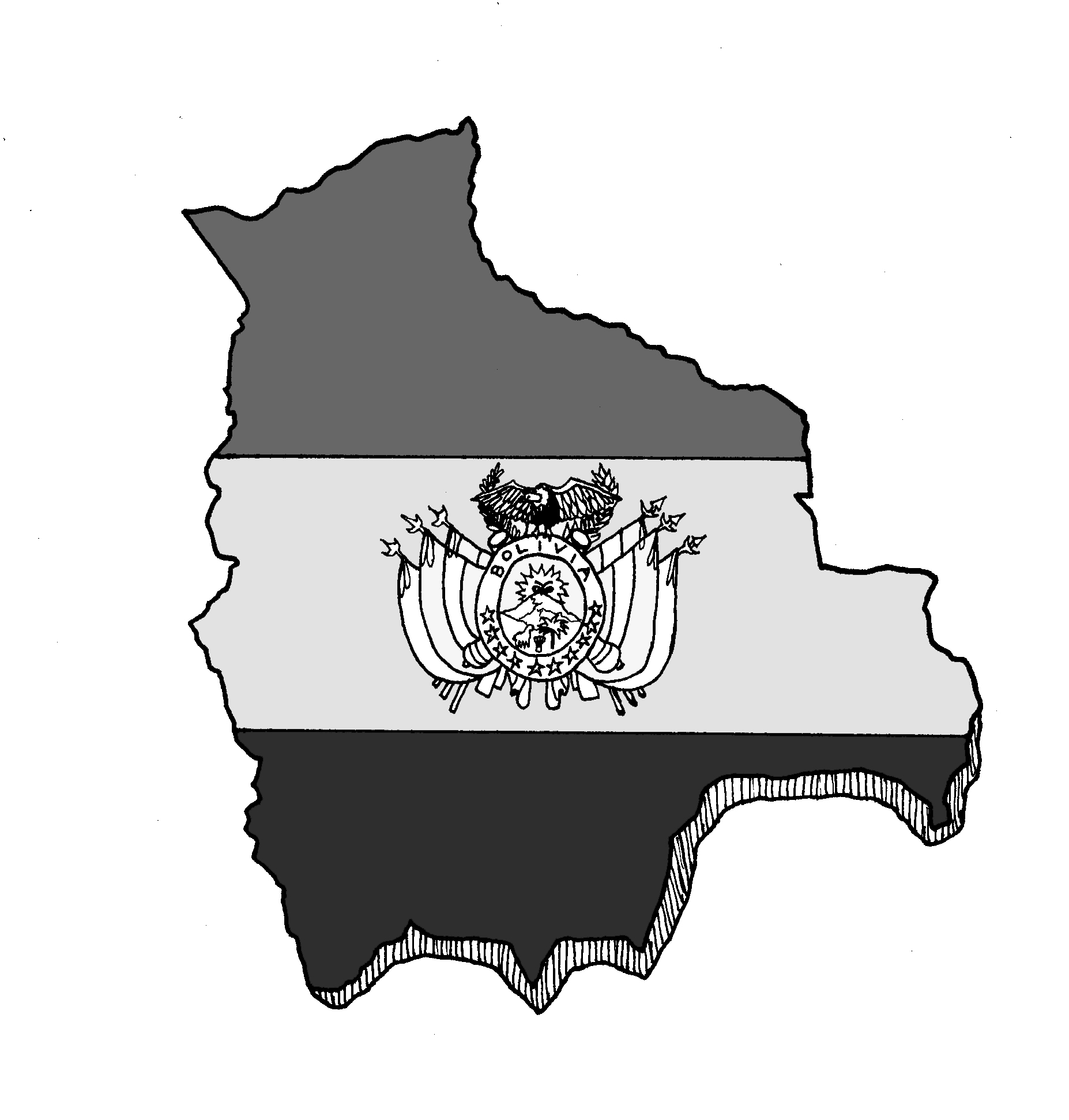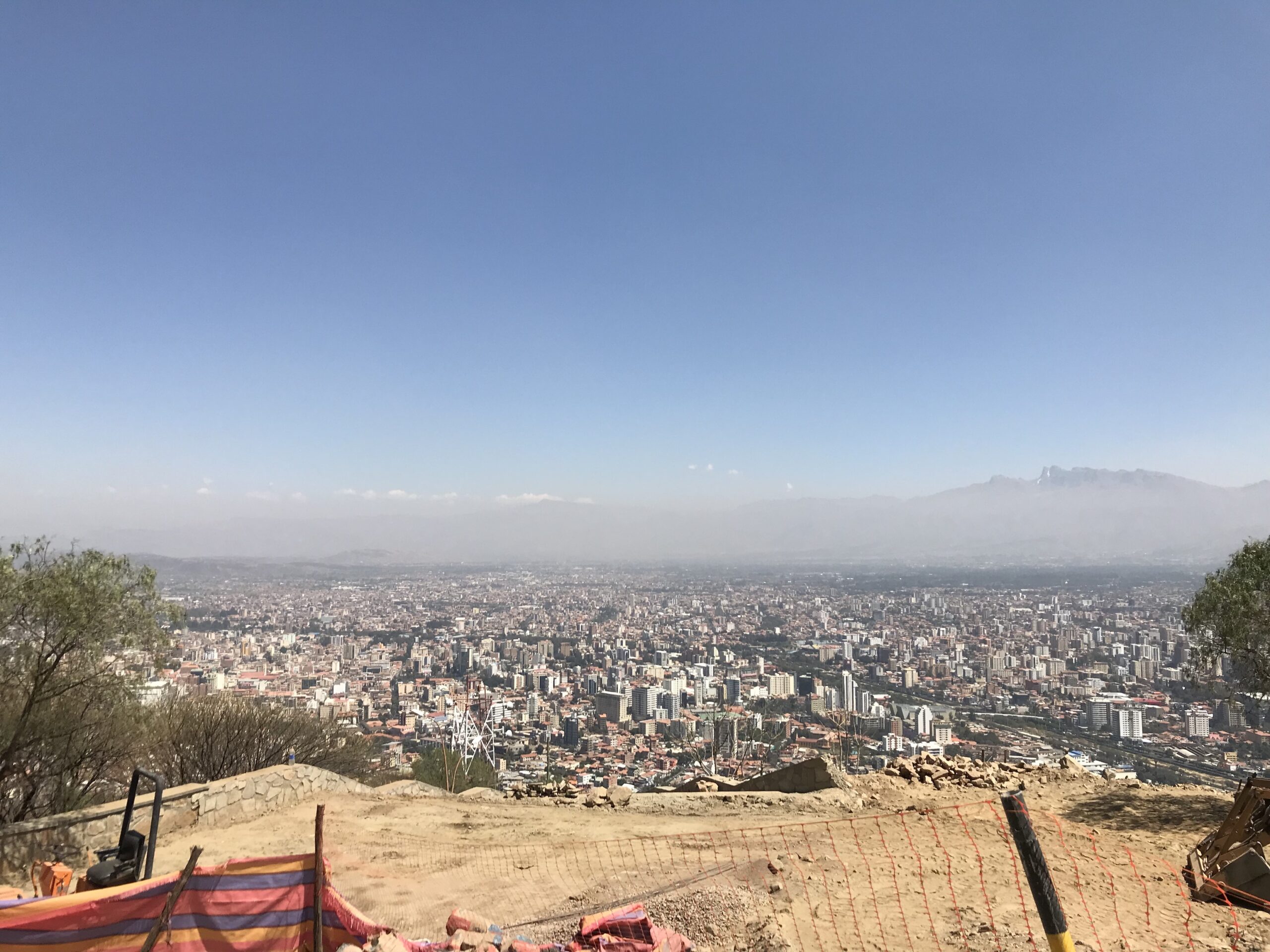Bolivia billowing: a Bowdoin student’s perspective on the crisis
November 15, 2019
 This
piece represents the opinion of the author
.
This
piece represents the opinion of the author
.
 Shona Ortiz
Shona OrtizI wake up to my host sister yelling outside.
“MAAAA EL PERRO!!”
Ah. She’s yelling at the dog.
Most Sundays start like this, a slow stirring into bursts of ruckus, until the whole family settles around our chair-packed kitchen table. We pass around a basket of pancito, spreading thick layers of dulce de leche onto their crumbling halves. I drink mate de coca tea and my host brothers poke fun at me, again, for not putting sugar in it.
By the time we’re all ready to leave the house, the sun is already blindingly hot and high. At an elevation of nearly 8,400 ft above sea level, the Cochabamba sun is dry and raw, its heat stirring parched yellow dust into the sweat on my feet, my arms, my face. As we step out the door, my host mother squishes a pink sun hat onto the head of her protesting daughter; she then turns to me, narrows her eyes and hands me a cap too. We poke each other with teasing frowns until we’re both laughing, and then we head to the streets. It is Sunday, October 20—Election Day.
Families climb up and down the hills, coming and going from the neighborhood voting center. An air normally filled with the grumbling of cars and “trufi” (a public mini-bus) engines only sounds with the light echoes of shoes on pavement, and the occasional shouts of children careening downhill in “rodadores” (wheeled toy that kids can ride). Voting is obligatory in Bolivia, and on this national election, cars are not allowed to drive, most restaurants and shops are closed, and alcohol has not been legally sold for two days. The streets belong to the people. My family and I hide from the sun beneath the spattered purple shade of jacaranda trees.
That night, we watch the vote count around the kitchen table, the TV flickering as we jump between news channels. Evo Morales is ahead, as expected, but Carlos Mesa is close behind—within 10 percentage points, close enough to lead to a “segunda vuelta”, a second round of voting in December. By the end of the night, although not all of the votes have been counted yet, Mesa declares that there will be a segunda vuelta, and Morales declares his essential victory. The vote count inexplicably pauses that same night.
 Manuela Velasquez
Manuela VelasquezOn Monday, I go to a Cafe. I do homework, and take trufi three like always. Monday night, the vote count starts up again, this time showing Morales ahead in the race by more than 10 percent. I sit at the kitchen table, my back leaning against the wall, watching as the news shifts over the TV screen. In La Plaza de Las Banderas downtown, people begin to protest. There are marches at the edges of the city. My host brother and I look on social media and see that there are protests erupting in cities all over Bolivia. I see a university president in La Paz with blood on his face, and fires in the streets in Potosí, and a burning building in Sucre, and I have no idea what’s going on. I fall asleep confused and with a nervousness for Bolivia and the people I’ve met.
On Tuesday, the School for International Training (SIT) program director in Bolivia asks me and the other students on the program to stay in our homestays. Blockades start going up throughout the entire city. The one on my corner stretches between two telephone poles, layered construction of packing tape, rocks and paper flags reading “Bolivia Dijo No!” These flags refer to the 2016 referendum that Morales held asking to extend the number of consecutive terms a president could serve in office, vying to run for a fourth term; to this referendum, Bolivia voted majority no (Morales then appealed the decision with the constitutional court and the constitution was changed, under the grounds that it is his human right to run for office). Tuesday night, in La Plaza de Las Banderas, a gigantic cabildo, or community assembly, fills the plaza and spills into the streets with thousands of participants calling for a segunda vuelta.
During the day on Wednesday, I can walk through the streets, though there are barely any cars, save for those serving as blockades. The students in my program and I get a message that we have to pack all of our belongings, just in case, and that that night we are moving to a Catholic retreat center. We drive over that night while some of the blockades are down. From inside the center, I can hear chanting on the streets outside. My friend shows me a video on “RT en Español” of Morales warning against a “golpe de estado” (a coup d’etat) in progress.
During the next few days, we spend most of our time behind the walls of the center. During the days, the streets stay blockaded and the air is quiet. There are hardly any sounds of cars, and the sun keeps shining in broad sheets. In this wave of calm, I feel like I’m holding my breath with the city. Thursday night, with the vote count at 99.9 percent, Morales declares victory, and Cochabamba explodes with protests over fraud. We only hear echoes from the center, but we sit together on a bed and watch videos of confrontations downtown. A couple of nights later, the blockades still continue (as they would for weeks after). They are guarded by civilians, some accompanied by kids riding little bikes around the blockades. On the same street, I see people gathering in an intersection, singing together and holding each other arm in arm. Firecrackers still go off. Bolivian flags are everywhere.
I say goodbye to my host family for two minutes that Saturday. SIT decides that our entire program will leave Bolivia and go to Buenos Aires on October 29.
I only lived and studied in Bolivia for two months, which was an incredible privilege in itself. I am not Bolivian, I am American-born. I cannot even begin to understand the depths of how complex this issue is, and I don’t want to pretend that I can. Especially as I’ve been living in Buenos Aires for the past couple weeks now, the news I see and read about a place that I am not in has to be critically considered. I know that there are debates about Bolivia right now across the world, especially regarding the politics of which countries label this a “golpe de estado” and which label it an uprising. There are additional complexities in how we evaluate different manifestations of undemocratic behavior. These abstracts and structures can be real and important, but they do not constitute an entire reality. I think that it’s incredibly important, throughout this conflict, to look closely and carefully at news on-the-ground in Bolivia, and focus on how realities are shifting—in ways that are hurting issues of race, class and liberties. In terms of atrocities being committed, especially against indigenous people and groups, these are real and harmful acts that should be paid attention to regardless of where one might stand in the debate. I have no authority on saying what the conflict is or isn’t—I just hope to share a little bit of what I saw and experienced.
All news has bias in one form or another, but these are some of the more widely-read news sources in Bolivia that I am currently reading (if people have more recommendations on different Bolivian news sources, please leave something in the comments!): Los Tiempos (based in Cochabamba; frequent Twitter updates), Página Siete (based in La Paz) and El Deber (based in Santa Cruz; frequent Twitter updates).
Manuela Velasquez is a member of the Class of 2021.
Comments
Before submitting a comment, please review our comment policy. Some key points from the policy:
- No hate speech, profanity, disrespectful or threatening comments.
- No personal attacks on reporters.
- Comments must be under 200 words.
- You are strongly encouraged to use a real name or identifier ("Class of '92").
- Any comments made with an email address that does not belong to you will get removed.

Great to see someone writing about Latin America!